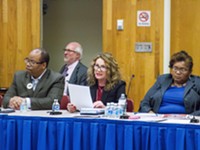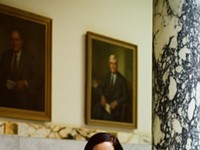Monday, May 5, 2014
Top court says Greece prayers are constitutional
Posted By Jeremy Moule on Mon, May 5, 2014 at 12:34 PM
In a decision issued this morning, the US Supreme Court says Greece officials are not violating the First Amendment by opening Town Board meetings with a prayer.
Rochester residents Susan Galloway and Linda Stephens filed the initial complaint against the Town of Greece. Since 1999, the town has invited clergy from the Greece community to offer prayers at its Town Board meetings. In their lawsuit, Galloway and Stephens argued that the town essentially gave preference to Christian prayers, says the ruling. They wanted the courts to limit the town to inclusive prayers that reference God only in a general sense.
But the court majority sided with the town. Justice Anthony Kennedy drew on the prayer traditions of Congress and state legislatures in writing the majority opinion. He wrote:
Greece officials drew from churches represented in the community, Kennedy wrote, which happen to be predominantly Christian.
Chief Justice John Roberts, Justice Samuel Alito, Justice Antonin Scalia, and Justice Clarence Thomas joined Kennedy in the majority. Their ruling reversed a lower court decision against the Town of Greece.
Justices Stephen Breyer, Elena Kagan, Ruth Bader Ginsburg, and Sonia Sotomayor dissented. Writing for the minority, Kagan said that the problem isn't the content of the prayers so much as the town's process for selecting who offers them. The town didn't make serious, sustained efforts to reach out to "adherents of non-Christian religions," she wrote. She continued:
Rochester residents Susan Galloway and Linda Stephens filed the initial complaint against the Town of Greece. Since 1999, the town has invited clergy from the Greece community to offer prayers at its Town Board meetings. In their lawsuit, Galloway and Stephens argued that the town essentially gave preference to Christian prayers, says the ruling. They wanted the courts to limit the town to inclusive prayers that reference God only in a general sense.
But the court majority sided with the town. Justice Anthony Kennedy drew on the prayer traditions of Congress and state legislatures in writing the majority opinion. He wrote:
"Ceremonial prayer is but a recognition that, since this Nation was founded and until the present day, many Americans deem that their own existence must be understood by precepts far beyond the authority of government to alter or define and that willing participation in civic affairs can be consistent with a brief acknowledgment of their belief in a higher power, always with due respect for those who adhere to other beliefs. The prayer in this case has a permissible ceremonial purpose. It is not an unconstitutional establishment of religion."
Greece officials drew from churches represented in the community, Kennedy wrote, which happen to be predominantly Christian.
Chief Justice John Roberts, Justice Samuel Alito, Justice Antonin Scalia, and Justice Clarence Thomas joined Kennedy in the majority. Their ruling reversed a lower court decision against the Town of Greece.
Justices Stephen Breyer, Elena Kagan, Ruth Bader Ginsburg, and Sonia Sotomayor dissented. Writing for the minority, Kagan said that the problem isn't the content of the prayers so much as the town's process for selecting who offers them. The town didn't make serious, sustained efforts to reach out to "adherents of non-Christian religions," she wrote. She continued:
"So month in and month out for over a decade, prayers steeped in only one faith, addressed toward members of the public, commenced meetings to discuss local affairs and distribute government benefits. In my view, that practice does not square with the First Amendment’s promise that every citizen, irrespective of her religion, owns an equal share in her government."





